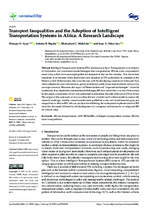| dc.contributor.author | Ajayi, Olasupo O | |
| dc.contributor.author | Bagula, Antoine B | |
| dc.contributor.author | Maluleke, Hloniphani C | |
| dc.contributor.author | Odun-Ayo, Isaac A | |
| dc.date.accessioned | 2022-01-17T08:27:20Z | |
| dc.date.available | 2022-01-17T08:27:20Z | |
| dc.date.issued | 2021 | |
| dc.identifier.citation | Ajayi, O.O.; Bagula, A.B.; Maluleke, H.C.; Odun-Ayo, I.A. Transport Inequalities and the Adoption of Intelligent Transportation Systems in Africa: A Research Landscape. Sustainability 2021, 13, 12891. https://doi.org/ 10.3390/su132212891 | en_US |
| dc.identifier.uri | https://doi.org/ 10.3390/su132212891 | |
| dc.identifier.uri | http://hdl.handle.net/10566/7096 | |
| dc.description.abstract | Intelligent Transportation Systems (ITS), also known as Smart Transportation, is an infusion
of information and communication technologies into transportation. ITS are a key component of
smart cities, which have seen rapid global development in the last few decades. This has in turn
translated to an increase in the deployment and adoption of ITS, particularly in countries in the
Western world. Unfortunately, this is not the case with the developing countries of Africa and Asia,
where dilapidated road infrastructure, poorly maintained public/mass transit vehicles and poverty
are major concerns. However, the impact of Westernization and “imported technologies” cannot be
overlooked; thus, despite the aforementioned challenges, ITS have found their way into African cities.
In this paper, a systematic review was performed to determine the state of the art of ITS in Africa.
The output of this systematic review was then fed into a hybrid multi-criteria model to analyse the
research landscape, identify connections between published works and reveal research gaps and
inequalities in African ITS. African peculiarities inhibiting the widespread implementation of ITS
were then discussed, followed by the development of a conceptual architecture for an integrated ITS
for African cities | en_US |
| dc.language.iso | en | en_US |
| dc.publisher | MDPI | en_US |
| dc.subject | African transportation | en_US |
| dc.subject | AHP | en_US |
| dc.subject | Smart transportation | en_US |
| dc.subject | Big data | en_US |
| dc.subject | Technologies | en_US |
| dc.title | Epidemiological comparison of the first and second waves of the COVID-19 pandemic in Nigeria, February 2020-April 2021 | en_US |
| dc.type | Article | en_US |

